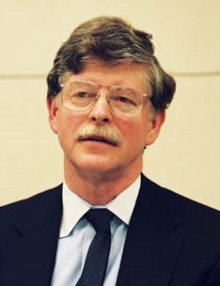
Osama bin Mohammed bin Awad bin Laden was a Saudi Arabian-born Islamist dissident and militant leader who was the founder and first general emir of al-Qaeda from 1988 until his death in 2011. Ideologically a pan-Islamist,he participated in the Afghan jihad against the Soviet Union and supported the activities of the Bosnian mujahideen during the Yugoslav Wars. Bin Laden is most widely known as the mastermind behind the September 11 attacks in the United States.

Jean-Bertrand Aristide is a Haitian former Salesian priest and politician who became Haiti's first democratically elected president. As a priest,he taught liberation theology and,as a president,he attempted to normalize Afro-Creole culture,including Vodou religion,in Haiti. Aristide was appointed to a parish in Port-au-Prince in 1982 after completing his studies to become a priest. He became a focal point for the pro-democracy movement first under Jean-Claude "Baby Doc" Duvalier and then under the military transition regime which followed. He won the 1990–91 Haitian general election,with 67% of the vote.

The al-Shifapharmaceutical factory in Kafouri,Khartoum North,Sudan,was constructed between 1992 and 1996 with components imported from Germany,India,Italy,Sweden,Switzerland,Thailand and the United States. It was opened on 12 July 1997 and bombed by the United States on 20 August 1998. The industrial complex was composed of four buildings. It was the largest pharmaceutical factory in Khartoum and employed over 300 workers,producing medicine both for human and veterinary use.

Omar Hassan Ahmad al-Bashir is a Sudanese former military officer and politician who served as Sudan's head of state under various titles from 1989 until 2019,when he was deposed in a coup d'état. He was subsequently incarcerated,tried and convicted on multiple corruption charges. He came to power in 1989 when,as a brigadier general in the Sudanese Army,he led a group of officers in a military coup that ousted the democratically elected government of prime minister Sadiq al-Mahdi after it began negotiations with rebels in the south;he subsequently replaced President Ahmed al-Mirghani as head of state. He was elected three times as president in elections that have been under scrutiny for electoral fraud. In 1992,al-Bashir founded the National Congress Party,which remained the dominant political party in the country until 2019. In March 2009,al-Bashir became the first sitting head of state to be indicted by the International Criminal Court (ICC),for allegedly directing a campaign of mass killing,rape,and pillage against civilians in Darfur. On 11 February 2020,the Government of Sudan announced that it had agreed to hand over al-Bashir to the ICC for trial.
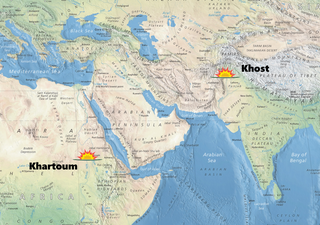
Operation Infinite Reach was the codename for American cruise missile strikes on al-Qaeda bases that were launched concurrently across two continents on 20 August 1998. Launched by the U.S. Navy,the strikes hit the al-Shifa pharmaceutical factory in Khartoum,Sudan,and a camp in Khost Province,Afghanistan,in retaliation for al-Qaeda's August 7 bombings of American embassies in Kenya and Tanzania,which killed 224 people and injured over 4,000 others. Operation Infinite Reach was the first time the United States acknowledged a preemptive strike against a violent non-state actor.

Richard Alan Clarke is an American national security expert,novelist,and former government official. He served as the Counterterrorism Czar for the National Coordinator for Security,Infrastructure Protection,and Counter-Terrorism for the United States between 1998 and 2003.

Patrick Francis Kennedy is a former career Foreign Service Officer who served as the U.S. State Department's Under Secretary of State for Management. He was Director of the Office of Management Policy,Rightsizing and Innovation. He has been Deputy Director for Management at the cabinet level Office of the Director of National Intelligence;he returned to the Department of State on May 7,2007. Kennedy was U.S. Ambassador to the United Nations for Management and Reform and previously served as Chief of Staff for the Coalition Provisional Authority in Iraq. He was the Assistant Secretary of State for Administration for the Clinton Administration from 1993 to 2001. In 2014,Kennedy was elected as a fellow of the National Academy of Public Administration.
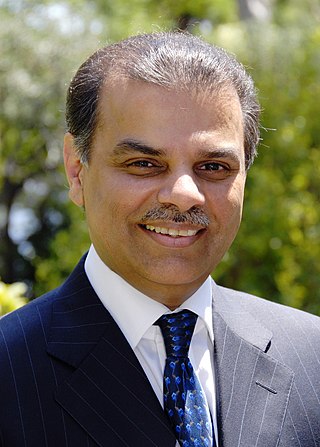
Mansoor Ijaz is a Pakistani-American venture financier and hedge-fund manager. He is founder and chairman of Crescent Investment Management Ltd,a New York and London-based investment firm that operates CARAT,a proprietary trading system developed by Ijaz in the late 1980s. His venture investments included unsuccessful efforts in 2013 to acquire a stake in Lotus F1,a Formula One team. In the 1990s,Ijaz and his companies were contributors to Democratic Party institutions as well as the presidential candidacies of Bill Clinton.

This article covers the period of the history of Sudan between 1985 and 2019 when the Sudanese Defense Minister Abdel Rahman Swar al-Dahab seized power from Sudanese President Gaafar Nimeiry in the 1985 Sudanese coup d'état. Not long after,Lieutenant General Omar al-Bashir,backed by an Islamist political party,the National Islamic Front,overthrew the short lived government in a coup in 1989 where he ruled as President until his fall in April 2019. During Bashir's rule,also referred to as Bashirist Sudan,or as they called themselves the al-Ingaz regime,he was re-elected three times while overseeing the independence of South Sudan in 2011. His regime was criticized for human rights abuses,atrocities and genocide in Darfur and allegations of harboring and supporting terrorist groups in the region while being subjected to United Nations sanctions beginning in 1995,resulting in Sudan's isolation as an international pariah.
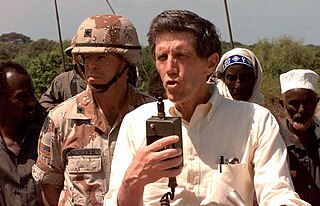
Robert Bigger Oakley was an American diplomat whose 34-year career (1957–1991) as a Foreign Service Officer included appointments as United States Ambassador to Zaire,Somalia,and Pakistan and,in the early 1990s,as a special envoy during the American involvement in Somalia.
The foreign policy of the Bill Clinton administration was of secondary concern to a president fixed on domestic policy. He relied chiefly on his two experienced Secretaries of State Warren Christopher (1993–1997) and Madeleine Albright (1997–2001),as well as Vice President Al Gore. The Cold War had ended and the Dissolution of the Soviet Union had taken place under his predecessor President George H. W. Bush,whom Clinton criticized for being too preoccupied with foreign affairs. The United States was the only remaining superpower,with a military strength far overshadowing the rest of the world. There were tensions with countries such as Iran and North Korea,but no visible threats. Clinton's main priority was always domestic affairs,especially economics. Foreign-policy was chiefly of interest to him in terms of promoting American trade. His administration signed more than 300 bilateral trade agreements. His emergencies had to do with humanitarian crises which raised the issue of American or NATO or United Nations interventions to protect civilians,or armed humanitarian intervention,as the result of civil war,state collapse,or oppressive governments.
Robert Vossler Keeley had a 34-year career in the Foreign Service of the United States,from 1956 to 1989. He served three times as Ambassador:to Greece (1985–89),Zimbabwe (1980–84),and Mauritius (1976–78). In 1978–80 he was Deputy Assistant Secretary of State for African Affairs,in charge of southern and eastern Africa.

Haiti–United States relations are bilateral relations between Haiti and the United States. Succeeding U.S. presidents refused to recognize Haiti until Abraham Lincoln. The U.S. tried to establish a military base in Haiti and invaded. It withdrew in 1934 but continued to intervene in Haiti during subsequent decades.

Jordan has been a very close ally of the United States for decades,dating back to the establishment of bilateral relations between the two countries in 1949. The country was named a major non-NATO ally of the U.S. in 1996.

Sudan–United States relations are the bilateral relations between Sudan and the United States. The United States government has been critical of Sudan's human rights record and has dispatched a strong UN Peacekeeping force to Darfur. Relations between both countries in recent years have greatly improved,with Sudan's post-revolutionary government compensating American victims of al-Qaeda terror attacks,the removal of Sudan from the State Department's blacklist of state sponsors of terrorism and the United States Congress having reinstated Sudan's sovereign immunity in December 2020.
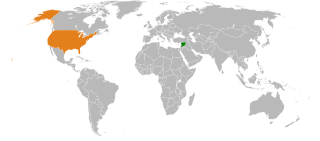
Diplomatic relations between Syria and the United States are currently non-existent;they were suspended in 2012 after the onset of the Syrian Civil War. Priority issues between the two states include the Arab–Israeli conflict,the Golan Heights annexation,Iraq War,alleged state-sponsorship of terrorism,occupation of Lebanon,etc.
Sudan has a conflict in the Darfur area of western Sudan. The Khartoum government had,in the past,given sanctuary to trans-national Islamic terrorists,but,according to the 9/11 Commission Report,ousted al-Qaeda and cooperated with the US against such groups while simultaneously involving itself in human rights abuses in Darfur. There are also transborder issues between Chad and Darfur,and,to a lesser extent,with the Central African Republic.

The 1991 Haitian coup d'état took place on 29 September 1991,when President Jean-Bertrand Aristide,elected eight months earlier in the 1990–91 Haitian general election,was deposed by the Armed Forces of Haiti. Haitian military officers,primarily Army General Raoul Cédras,Army Chief of Staff Philippe Biamby and Chief of the National Police,Michel François led the coup. Aristide was sent into exile,his life only saved by the intervention of US,French and Venezuelan diplomats. Aristide would later return to power in 1994.
Since the 19th century,the United States government has participated and interfered,both overtly and covertly,in the replacement of many foreign governments. In the latter half of the 19th century,the U.S. government initiated actions for regime change mainly in Latin America and the southwest Pacific,including the Spanish–American and Philippine–American wars. At the onset of the 20th century,the United States shaped or installed governments in many countries around the world,including neighbors Hawaii,Panama,Honduras,Nicaragua,Mexico,Haiti,and the Dominican Republic.
Donald K. Petterson is an American diplomat,and a career United States Foreign Service officer.
